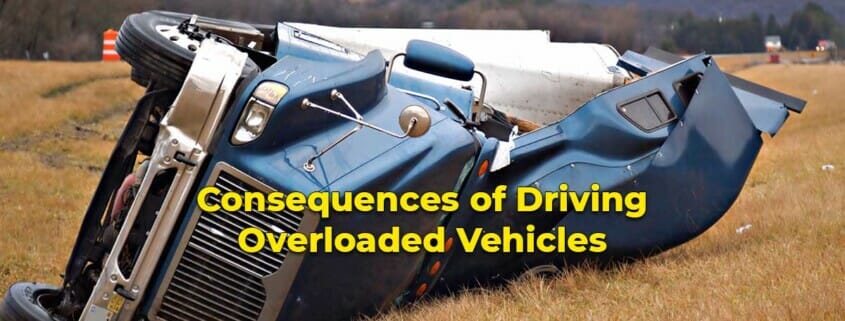Consequences of Driving Overloaded Vehicles
Your rig is up for any task you throw at it and never backs down. You expect it to handle long hauls without bogging down, all while keeping you and your cargo safe & secure.
With the economy coming back, it is critical to delivering needed items. Getting more freight delivered benefits the whole value chain. Everyone must understand how overloaded vehicles have significant consequences, which relate to a variety of things, such as:
- Driving problems
- Regulation violations
- Maintenance problems
- Liability
Education Makes a Difference
You want everyone involved to understand the consequences of driving an overloaded vehicle. Through understanding the problems, you minimize the risk. An overloaded vehicle means that the weight exceeds the gross weight vehicle rating. You have several other factors that can influence whether a truck classifies as overloaded, such as the gross axle weight rating and the gross combined weight rating.
Infinit-I Workforce Solutions provides training designed to help manage overweight vehicles. Sign up for a Free Live Demo.
Driving Problems
Overloaded vehicles threaten road safety, and fatal accidents have happened because of them. Proper front-end steering gets thrown off balance, and because of excessive weight in the back, the truck’s steering won’t respond as promptly. Add excessive speed and maneuverability issues, and you have a recipe for disaster. Braking becomes another problem. You can misjudge the stopping distance because of an overloaded vehicle. Overloaded vehicles need more distance to stop, and the driver can minimize this more easily.
Each of the components will operate within specific parameters. However, even in this environment, physics does play a role.
Regulation Violations
People who violate the overloaded fleet vehicle regulations may face fines. However, two vehicles with the same weight overload could face different penalties because of the fine schedule. For example, a truck with a registered gross vehicle weight of 20,000 pounds that weighs in at 25,000 pounds may have to pay $500. Meanwhile, you could have another truck with a gross vehicle weight of 60,000 pounds that weighs in at 65,000 pounds. They only pay $250 because of the fine schedule.
Keep in mind; this only gives you an example. How much driving an overloaded vehicle costs will depend on the state that you drive in.
In some cases, you may face criminal charges for overloading a vehicle. Some of the examples include:
- Reckless endangerment
- Manslaughter
- Assault
Maintenance Problems
Overloading a fleet vehicle comes with maintenance problems as well. This can cost companies tens of thousands of dollars. Not only do the repairs cost money, but you lose money when your vehicle sits idle. In addition, many components in the truck can break because of the exceeding capacity.
Especially considering how you could have prevented the breakdown of your vehicle, it doesn’t make much sense to overload it. This can cause driver and customer commitment issues, and considering how you could have prevented it, it doesn’t make sense to overload the vehicle. When you overload your truck, it increases the cost of maintenance. The operating system is strained, and components like the tie rods, the engines, the tires, and drivetrain components can break down.
Liability
Supervisors and drivers may have the mistaken belief that weight restrictions don’t apply to them, but no one has an exemption from running safe and compliant vehicles. Some organizations have approved for running overweight vehicles, but they still have to remain safe.
The consequences for not doing this can lead to outrageous litigation costs. For example, getting into an accident with another car on the road, they can file a lawsuit against your company, which can lead to tens of thousands of dollars in costs. The other danger is that because fleet vehicles are so large, it usually leads to fatal accidents.
Signs of an Overloaded Truck
The first most significant sign is that your truck will look overloaded. The rear end sags, and with hauls, may bounce close to the edge of the bed. The other danger of this comes from how an overloaded truck can lead to worn-out suspension. Finally, as you drive, you may hear cracking and squealing, which shows that you overloaded the truck.
Pay attention to the noises, and if you drive with excessive weight in the truck, inspect the leaf springs after. Another sign is that your truck doesn’t bounce. The suspension can’t handle the weight. Your truck should bounce slightly as you drive it. It’s a bad sign if the truck doesn’t bounce.
Next, are you struggling to maneuver the steering wheel? An overloaded vehicle can have a big impact on the steering wheel, and it won’t be as responsive when driving. However, with this one, you have to exercise caution because other things may be causing the steering wheel not to handle appropriately, such as:
- Improper tire pressure
- Power steering pump failure
- Steering rack problems
- Power steering fluid issue
- Serpentine belt damage
Why Overloading Your Truck is Bad
Along with all the other issues mentioned, your vehicle won’t last as long if you overload it. The rear suspension could fail. Meanwhile, your leaf springs might be fine, but the center bolts could crack and cause further problems with your suspension. Another real danger exists that you could damage your payload. In a perfect world, your payload makes it to its destination without a problem. You keep your load safe from the correct management of it.
How to Maximize Your Payloads without Going Over
First, upgrade the rear springs. This evenly distributes the weight across the truck body. You have four springs that support the truck’s suspension, and adding springs or upgrading to high-grade springs can increase your truck’s ability to carry loads.
Coil-over shock absorbers help your truck to drive over smooth surfaces. Bumps will create a movement where the weight shifts onto the springs. Gain more control over your vehicle while minimizing these movements through having coil-over shock absorbers. You should also understand how much weight your truck can carry because this goes a long way to preventing overload.
Hopefully, you have seen the dangers of overloading your fleet of vehicles. Overloading can cost your company more than what it’s worth. It’s hard on your fleet, and you will have a more challenging time maintaining your vehicles because they break down more often. You don’t want to be anywhere near when you consistently overload a truck because it always leads to problems. While your truck can pull its weight, it wouldn’t be wise to regularly overload it unless you want problems. Many people understand how they shouldn’t overload the truck, but they still do it. Knowing the specific consequences can hopefully help to stave off this problem.






Leave a Reply
Want to join the discussion?Feel free to contribute!